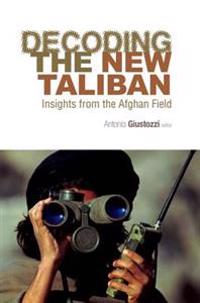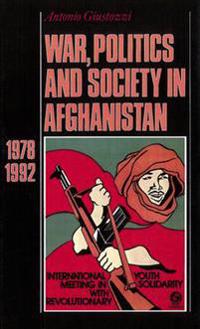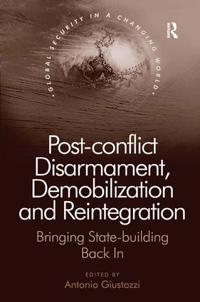Decoding the New Taliban: Insights from the Afghan Field (Häftad)
avAntonio Giustozzi
ISBN: 9780199326938 - UTGIVEN: 2012-01While the 'New Taliban' looms large in the global media, little is known about how it functions as an organisation. How united is it? Are its structures relatively strong, or surprisingly brittle? Are personal relations and networking based on traditional ties of kin and ethnicity the sum total of i[...]
War, Politics and Society in Afghanistan, 1978-1992 (Inbunden)
avAntonio Giustozzi
ISBN: 9780878407583 - UTGIVEN: 2000-06This book is the first to analyze the institutions, successes, and failures of the People's Democratic Party of Afghanistan, the pro-Soviet regime that sought to dominate the country during the years of the Soviet military presence. Antonio Giustozzi explores the military, political, and social stra[...]
Post-conflict Disarmament, Demobilization and Reintegration (Inbunden)
avAntonio Giustozzi
ISBN: 9781409437383 - UTGIVEN: 201204This book revisits post-Cold War Disarmament Disintegration and Reintegration (DDR) programmes in the light of previous experiences of disarmament, demobilisation and reintegration. In the history of North America and Europe, in particular, such programmes had a major impact on state-building, contr[...]
Policing Afghanistan (Inbunden)
avAntonio Giustozzi, Mohammed Isaqzadeh
ISBN: 9781849042055 - UTGIVEN: 201302Policing is not a popular topic of serious scholarly research. Although a vast literature on policing exists, it is mostly technical in nature and only rarely analytical. Even the police forces of Western Europe and North America have rarely been investigated in depth as far as their history and fun[...]
Empires of Mud (Häftad)
avAntonio Giustozzi
ISBN: 9781849042253 - UTGIVEN: 2012-08Warlords are charismatic military leaders who exploit weak central authorities in order to gain control of sub-national areas. Notwithstanding their bad reputation, warlords have often participated in state formation. In Empires of Mud Giustozzi analyses the dynamics of warlordism in Afghanistan wi[...]
Empires of Mud (Inbunden)
avAntonio Giustozzi
ISBN: 9781850659327 - UTGIVEN: 2009-01Warlords, namely charismatic military leaders who exploit the weakness of central authorities to seize control of and autonomously rule a sub-national area, have earned much notoriety in recent years on account of the excesses of civil wars in Liberia, Somalia and Afghanistan. But notwithstanding th[...]








